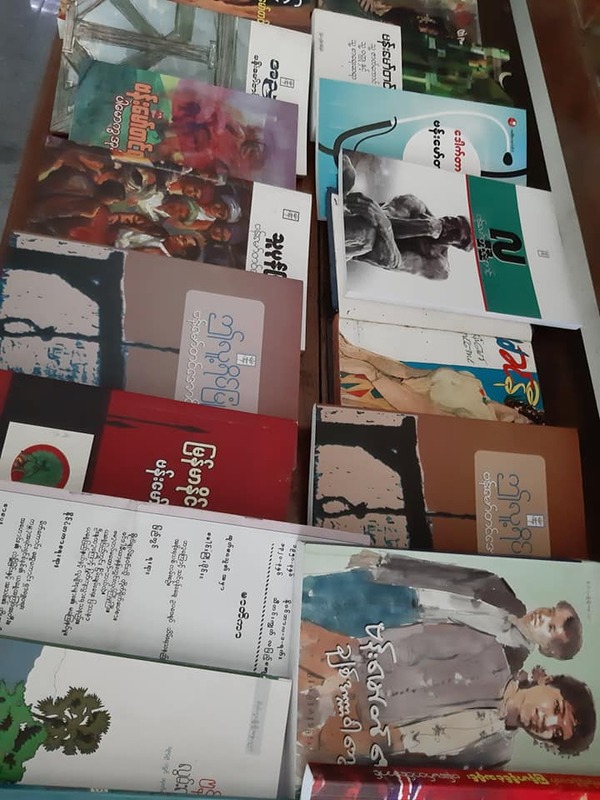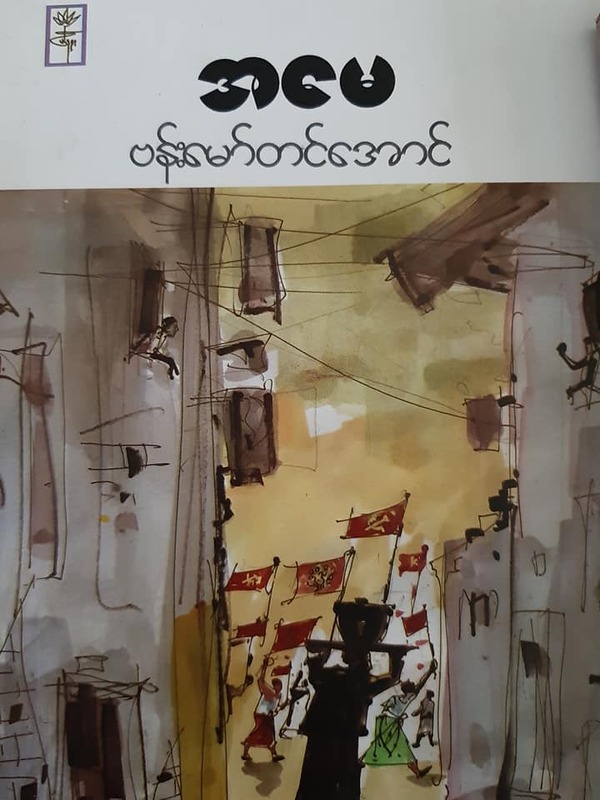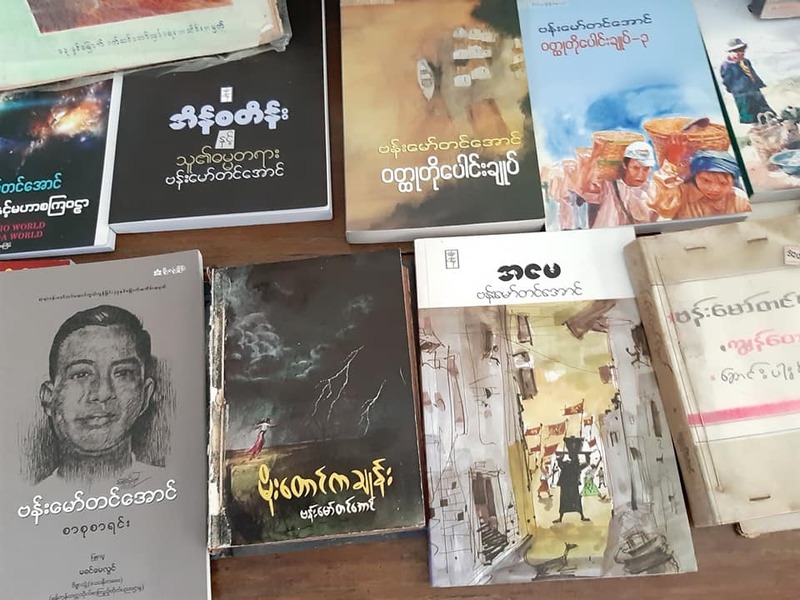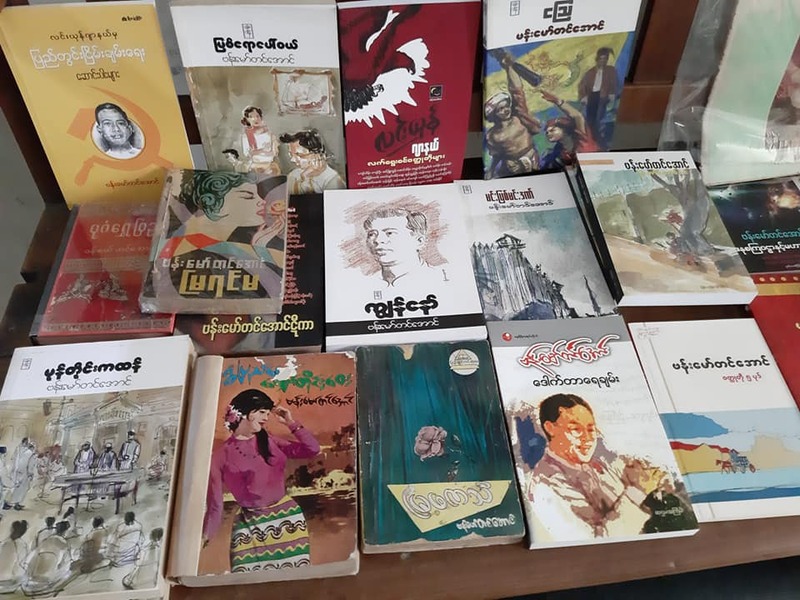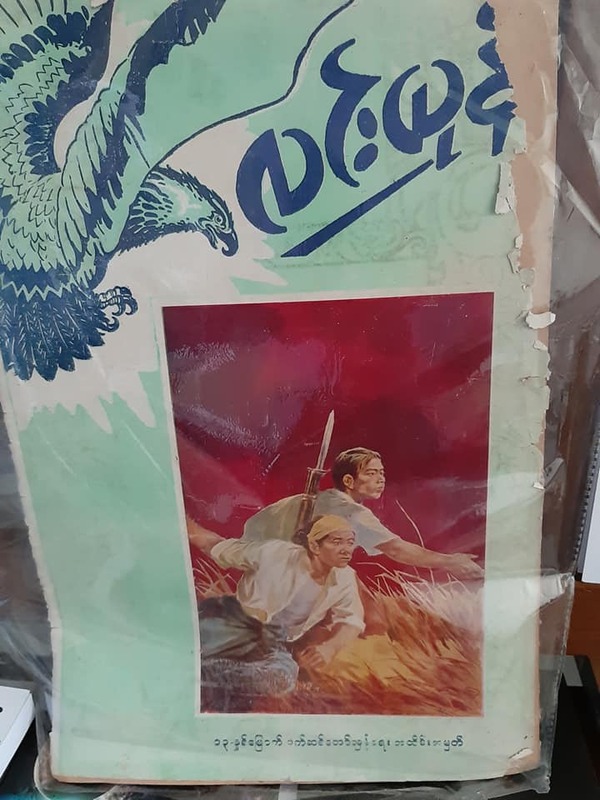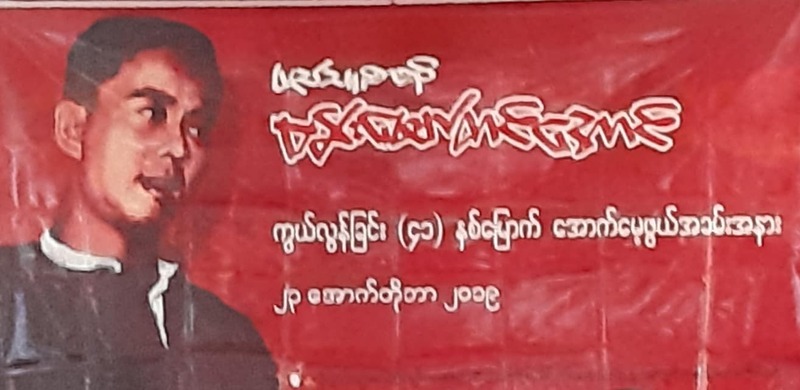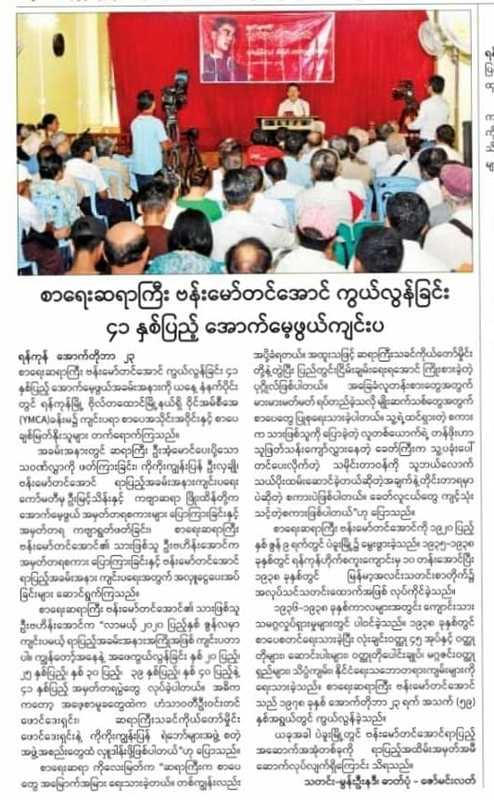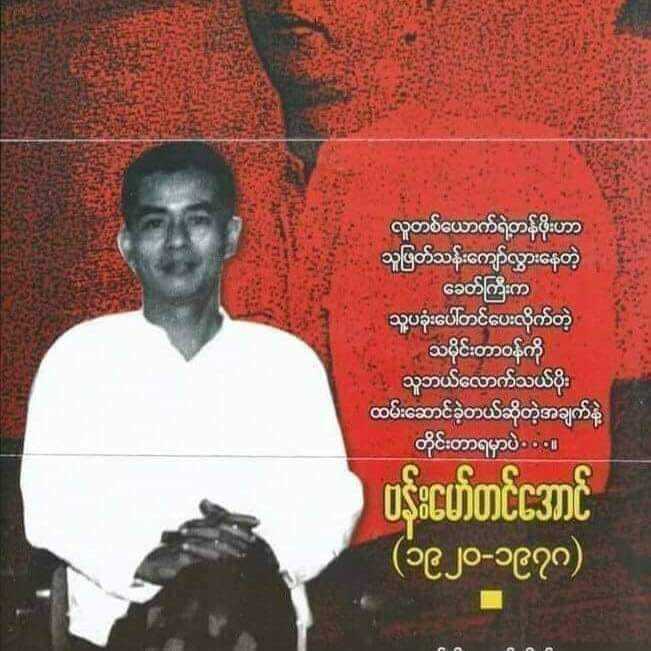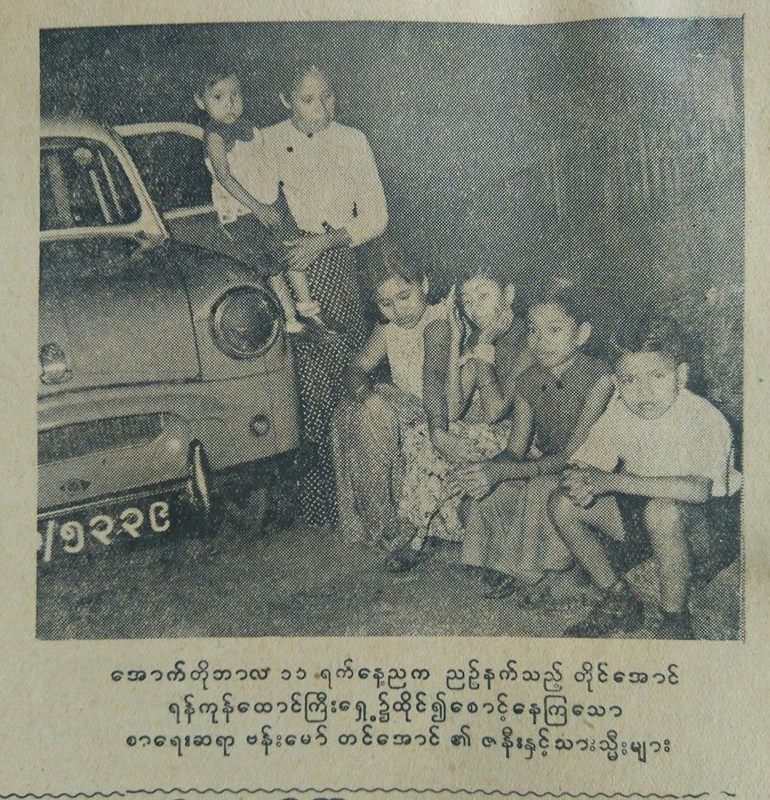Bamaw Tin Aung
Person Item Type Metadata
Birth Date
Birthplace
Death Date
1978
Occupation
Biographical Text
https://www.mmtimes.com/news/memory-famous-writer-celebrated.html
Bibliography
Born in 1920 in Bago, the charismatic author Bamaw Tin Aung would have celebrated his 100th birthday next year. Having passed away in 1978, the SarpeyBeikman (“House of Literature”) building held a pre-centennial event on June 9 to commemorate his life.
A crowd of book lovers and history buffs filled the entire second floor of the building to discuss and celebrate the controversial author’s life.
At a time of tumultuous change, Bamaw Tin Aung’s legacy was hotly debated. One audience member commented on the author’s staunch to Marxism and compared him with the good side of Che Guevara who gave up his medical career to join Cuban Revolution, highlighting how radicalised some writers were back then.
10-11-file10109.jpg
Speakers at the event also highlighted Bamaw Tin Aung’s pursuit of perpetual peace and democracy for Myanmar, keeping sided with the proletariat, a movement promising so much hope for the country’s post-war population.
Another speaker complimented Bamaw Tin Aung for his stoic mentality, when he was arrested and sent to the infamous jail in Coco Island – some 400 kilometres away from Yangon in the Andaman Sea. He was one of a number of author’s during the time of Burmese Way to Socialism, who were locked away, simply for publicising ideas that the then government disagreed with.
He wrote over 70 books during his lifetime, including the classic Einstein and his Dhamma. At a time of immense change in the world, it was a book which tried to make sense of Einstein through a local-Myanmar mindset.
Taking a pessimistic view of human nature overall, and seeing people as inherently corruptible, he wrote believing left-wing politics would solve many of society’s problems. In hindsight that may have been understandable, as people were simply unaware of the tragedies that would unfold in place like the USSR, China, Cambodia and even Myanmar.
10-11-file10167.jpg
His political views influenced many young people during his lifetime, many of whom would have admired his ability to stand up to government power. Many people have criticised him, though, saying that he himself was also motivated by power.
He was jailed many times during his life for his convictions, highlighting the importance of freedom of speech as a personal value. His first stint was for five years, between 1952 and 1957; then just a year later until 1959.
He was also imprisoned for his writings from 1965 to 1972 in Coco Island and Insein Prison. In the island he organised a 40-day protest to draw attention to the rights of prisoners, gaining victory from the authority for other fellow political prisoners.
Though born in Bago he assumed the pen name “Bamaw”, after moving to the scenic town (also spelt “Bhamo”) in Kachin state near the Chinese border. He assumed many other pen names throughout his life, but this one has stuck more than the others.
During the prewar period he entered the literary world with a short story written in pen name of “Maha Aung” – “The Great Aung”. He established his fame with his novel Phone Maung Ta Yout Te in 1947. In 1950, he became a journalist publishing articles in the Lin Yone journal and newspaper during the late 1950s.
Aside from his literary works and commitment to politics, he is also remembered for saying the only person to really possess his ego was his wife, KhinOo. He passed away on October 23, 1978, leaving his wife and six children behind.
“The way to judge one’s value is to measure the extent to which people carry the duties of history on their shoulders,” he once stated. That maybe true, but what those duties are and how they affect others is another matter entirely.
Never one to hold political power, or to see the recent reforms in Myanmar, it would be interesting to know his thoughts on the country’s development today. It’s a much different place, despite the many years of stagnation – both inside, and outside, of Myanmar.
“It should take at least 20 years to evaluated a person,” said the author Yebaw Soe Chit.
10-11-file10156.jpg
Even though it’s been twice that time, it seems that the legacy of the prolific author is still very much up for debate.
San Lin Tun is a freelance Myanmar-English writer of essays, poetry, short stories and novels.
A crowd of book lovers and history buffs filled the entire second floor of the building to discuss and celebrate the controversial author’s life.
At a time of tumultuous change, Bamaw Tin Aung’s legacy was hotly debated. One audience member commented on the author’s staunch to Marxism and compared him with the good side of Che Guevara who gave up his medical career to join Cuban Revolution, highlighting how radicalised some writers were back then.
10-11-file10109.jpg
Speakers at the event also highlighted Bamaw Tin Aung’s pursuit of perpetual peace and democracy for Myanmar, keeping sided with the proletariat, a movement promising so much hope for the country’s post-war population.
Another speaker complimented Bamaw Tin Aung for his stoic mentality, when he was arrested and sent to the infamous jail in Coco Island – some 400 kilometres away from Yangon in the Andaman Sea. He was one of a number of author’s during the time of Burmese Way to Socialism, who were locked away, simply for publicising ideas that the then government disagreed with.
He wrote over 70 books during his lifetime, including the classic Einstein and his Dhamma. At a time of immense change in the world, it was a book which tried to make sense of Einstein through a local-Myanmar mindset.
Taking a pessimistic view of human nature overall, and seeing people as inherently corruptible, he wrote believing left-wing politics would solve many of society’s problems. In hindsight that may have been understandable, as people were simply unaware of the tragedies that would unfold in place like the USSR, China, Cambodia and even Myanmar.
10-11-file10167.jpg
His political views influenced many young people during his lifetime, many of whom would have admired his ability to stand up to government power. Many people have criticised him, though, saying that he himself was also motivated by power.
He was jailed many times during his life for his convictions, highlighting the importance of freedom of speech as a personal value. His first stint was for five years, between 1952 and 1957; then just a year later until 1959.
He was also imprisoned for his writings from 1965 to 1972 in Coco Island and Insein Prison. In the island he organised a 40-day protest to draw attention to the rights of prisoners, gaining victory from the authority for other fellow political prisoners.
Though born in Bago he assumed the pen name “Bamaw”, after moving to the scenic town (also spelt “Bhamo”) in Kachin state near the Chinese border. He assumed many other pen names throughout his life, but this one has stuck more than the others.
During the prewar period he entered the literary world with a short story written in pen name of “Maha Aung” – “The Great Aung”. He established his fame with his novel Phone Maung Ta Yout Te in 1947. In 1950, he became a journalist publishing articles in the Lin Yone journal and newspaper during the late 1950s.
Aside from his literary works and commitment to politics, he is also remembered for saying the only person to really possess his ego was his wife, KhinOo. He passed away on October 23, 1978, leaving his wife and six children behind.
“The way to judge one’s value is to measure the extent to which people carry the duties of history on their shoulders,” he once stated. That maybe true, but what those duties are and how they affect others is another matter entirely.
Never one to hold political power, or to see the recent reforms in Myanmar, it would be interesting to know his thoughts on the country’s development today. It’s a much different place, despite the many years of stagnation – both inside, and outside, of Myanmar.
“It should take at least 20 years to evaluated a person,” said the author Yebaw Soe Chit.
10-11-file10156.jpg
Even though it’s been twice that time, it seems that the legacy of the prolific author is still very much up for debate.
San Lin Tun is a freelance Myanmar-English writer of essays, poetry, short stories and novels.
Collection
Citation
“Bamaw Tin Aung,” MoeMaKa Online Library Archives, accessed December 25, 2025, http://moemaka.net/omeka2/items/show/177.



